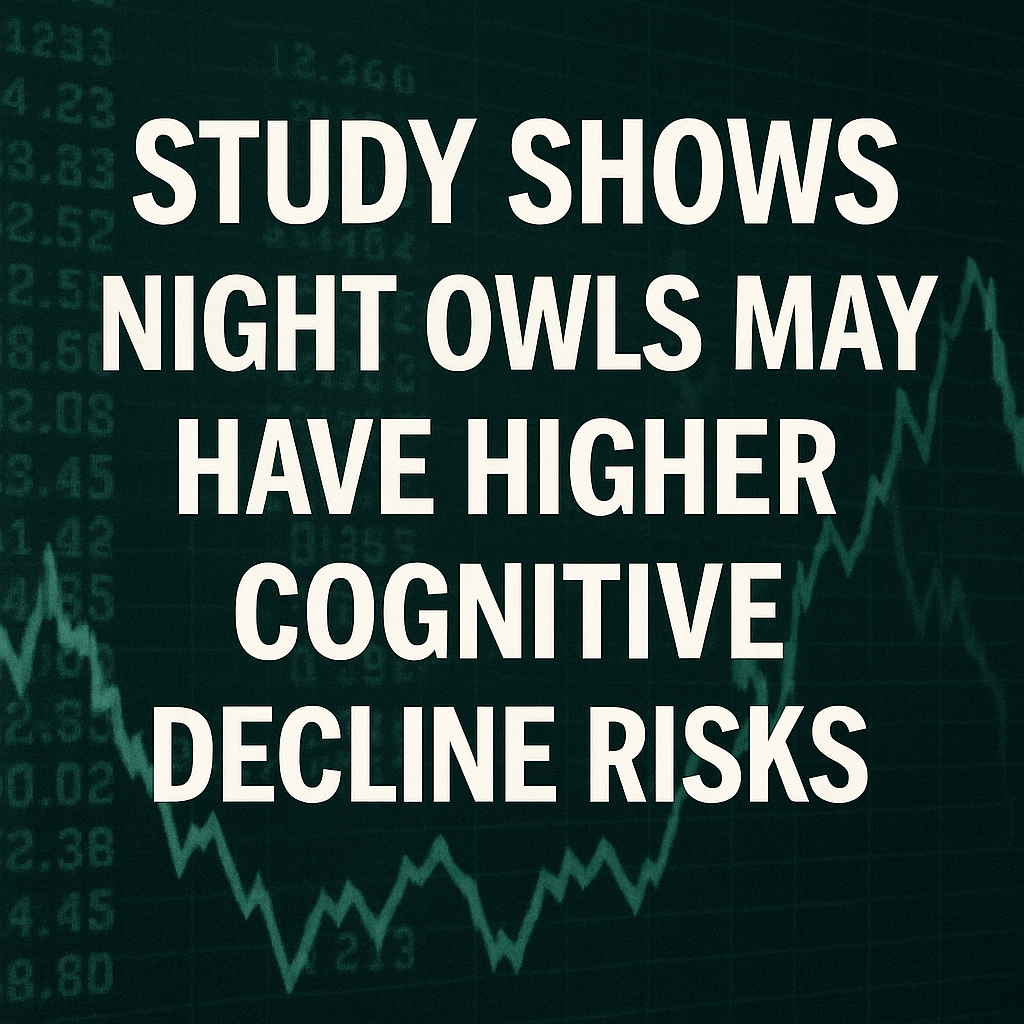Study Shows Night Owls May Have Higher Cognitive Decline Risks

Individuals classified as night owls—those whose natural body clocks, or chronotypes, align with late sleep and wake times—are often confronted with a variety of challenges in their routines. Forced to rise earlier for office jobs, they frequently experience societal bias from early risers. A recent investigation has added another concern to this list: night owls may experience a faster rate of cognitive decline than their early bird counterparts.
Study Overview and Methodology
The study, led by Ana Wenzler, a dementia researcher at the University of Groningen in the Netherlands, analyzed sleep patterns through extensive sleep-based questionnaires within the framework of the BIRD-NL Project. This large national study surveyed a demographically diverse group, revealing that 52% of participants were morning people, 44% identified as intermediates, and only about 5% were night owls. This distribution is notably different from the global averages, which typically report around 30% night owls, 40% early birds, and the remainder falling into intermediate categories.
Findings on Cognitive Function
Wenzler’s research included a longitudinal assessment of cognitive function over a span of ten years, focusing on executive function—a critical aspect of cognitive abilities such as problem-solving, memory, and reasoning. The results showcased a notable trend: evening-oriented individuals exhibited a pronounced decline in cognitive performance over the studied decade.
One of the critical insights drawn from Wenzler’s findings is that environmental and lifestyle factors may mitigate some of the cognitive decline associated with a late chronotype. “We found that 25% of the effect was due to lower sleep quality and smoking,” Wenzler explained. “Thus, adopting a healthier lifestyle can somewhat alleviate the adverse effects linked to late chronotypes.”
Implications of Education Level on Cognitive Decline
Intriguingly, Wenzler observed that the increased risk of cognitive decline primarily affected individuals with higher educational backgrounds. According to Wenzler, “This likely correlates with their sleep patterns; highly educated individuals often have jobs that require them to rise early, resulting in inadequate sleep duration, which hampers cognitive restoration.” This correlation aligns with previous studies suggesting that sleep deprivation amplifies health risks across various demographics, including conditions like diabetes and cardiovascular diseases.
Associated Health Risks for Night Owls
This latest study adds to a growing body of literature indicating that night owls may confront multiple health risks beyond cognitive decline. They appear to experience:
- A 30% higher risk of diabetes
- Nearly double the likelihood of developing depression and other psychological disorders
- An elevated risk of heart disease
- A 10% higher all-cause mortality risk
According to Matt Walker, a professor of neuroscience and psychology at the University of California, Berkeley, and director of the Center for Human Sleep Science, “The evidence underscores the critical importance of aligning sleep schedules with one’s natural chronotype. Disruptions to this synchronization result in significant health consequences.”
Can Chronotype Be Altered?
With societal demands often requiring modified sleep patterns, the question arises: can night owls transition to become early birds? Wenzler notes that while some research indicates that intensive intervention can lead to shifts in chronotype, the change is generally modest—often limited to a few hours. Forcing an extreme night owl to awaken early against their biological clock tends to yield ineffective results.
Walker reinforces this point, asserting that considerable shifts in chronotype require sustained efforts that are not feasible for the average individual. “It is essential to let night owls maintain their natural rhythm. Altering it significantly is both challenging and impractical based on current scientific consensus,” he stated.
Future Research Directions
Wenzler acknowledges the need for further investigations to explore the long-term implications of cognitive decline among night owls. “A follow-up of just ten years does not provide a complete picture. We cannot definitively state that these individuals face a predetermined cognitive decline towards dementia,” she clarifies. “Understanding if faster cognitive deterioration correlates to increased dementia risk requires substantial inquiry.”
As we continue to grapple with the complexities of chronotype and its impact on health, exploring lifestyle modifications remains crucial. Awareness and informed approach may assist in optimizing cognitive health and overall well-being for people of all chronotypes.
Additional Considerations for Maintaining Cognitive Health
- Physical Activity: Regular exercise has been linked to enhanced cognitive function and improved sleep quality.
- Nutrition: Adhering to a diet rich in antioxidants and omega-3 fatty acids may support brain health.
- Mental Stimulation: Engaging in lifelong learning and mental exercises can bolster cognitive resilience.
- Social Interaction: Maintaining social ties is crucial for cognitive health, reducing risks of depression and cognitive decline.
For access to innovative tools in assessing and balancing your chronotype, you can explore various online calculators to determine your sleep needs.
Conclusion
This recent study sheds light on the complicated relationship between chronotype, cognitive health, and overall well-being. As we advance our understanding of sleep and its various implications, fostering environments that accommodate individual biological rhythms may emerge as a vital strategy for promoting health across the lifespan.